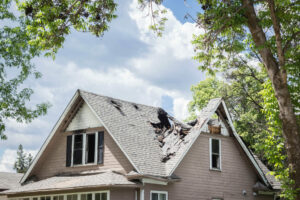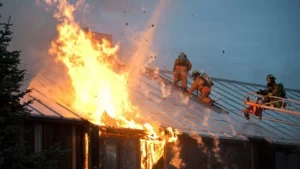Insurance is like a safety net that protects you financially in the event of an unfortunate event. People who own their own homes typically have a safety net in the form of fire insurance or homeowners insurance. These two types of protection may seem similar at first glance, but they serve different purposes. Understanding the key differences between homeowners insurance and fire insurance can help you determine how best to protect your home.
How do I get fire insurance?
Insurance that protects your property from damage or loss due to fire is called fire insurance. This type of insurance typically covers the cost of repairing or rebuilding your home and replacing personal belongings lost in a fire. Fire insurance may also cover smoke, explosion, or water damage caused by a fire (such as the water used by firefighters to extinguish a fire). Additionally, fire insurance does not cover theft or general repair issues.
An interesting thing about fire insurance is that it also covers sheds, barns and other detached buildings on your property, as long as they are listed in the contract. In addition, some fire insurance policies cover your temporary living expenses if your home is damaged by fire and becomes uninhabitable. The exact contents of your coverage will depend on the policy terms, so it is important to read them carefully.
What does homeowners insurance cover?
Another name for homeowners insurance is a HO policy. This type of insurance provides more comprehensive coverage to protect your home, contents and personal belongings. Homeowners insurance covers a wider range of perils than fire insurance, which primarily covers damage from fire. Some of these risks include natural disasters such as hail or storms, theft, crime and even liability for injuries that occur on your land.
A typical homeowners insurance policy has three main types of coverage: homeowners insurance, personal property insurance and liability insurance. Home insurance protects the structure of your home, contents insurance protects your belongings in the home, and liability insurance protects you in the event that someone sues you for injuries or property damage caused by your negligence. Home insurance provides comprehensive financial security, which is why many people choose to get it.
What is the difference between fire insurance and homeowners insurance?
Fire insurance and homeowners insurance are both great ways to protect your home, but they have very different coverages and work in different ways. The only things that fire insurance covers are the damage and losses caused by the fire or the events surrounding the fire. In contrast, home insurance covers a wider range of risks, such as theft, water damage (not related to flooding), and legal claims.
Another important distinction is the organization of the law. People often get fire insurance, either separately or in addition to their existing home insurance, to be better protected in the event of a fire. Home insurance, on the other hand, is designed to be a comprehensive plan that protects against multiple risks at once. If fire safety is your primary concern, then a separate fire insurance policy may be right for you. However, for comprehensive coverage, homeowners insurance is a better option.
Situations not covered by fire insurance but covered by home insurance, or vice versa
Different types of fire insurance can cover different situations that regular homeowners insurance does not. For example, fire insurance often covers the broader costs associated with a fire, such as the cost of protecting a building from further damage after a fire. Fire insurance can even cover damage from wildfires, which some homeowners insurance policies do not offer.
On the other hand, homeowners insurance covers many things that fire insurance does not. If your home is damaged by bad weather, theft, or vandalism, you can file a claim with your home insurance. Liability protection is another important part of homeowners insurance that fire insurance does not offer. This type of coverage can be helpful if someone gets injured on your property and files a claim.
Things to Consider When Choosing Between Homeowners Insurance and Fire Insurance
There are many factors that affect whether you should get fire insurance, homeowners insurance, or both. Where you live is very important. You also need to bear your own risks and willingness. If you need protection against damage, theft, and other risks, homeowners insurance is the best choice.
Misconceptions About Home Insurance and Fire
A common misconception is that homeowners insurance covers all damage caused by fire. While it typically covers fire safety, it may not cover certain types of fires, such as those caused by negligence or intentional damage. People also assume that fire insurance and homeowners insurance cover the same risks. Fire insurance covers much more than other types of insurance. Things like property damage and personal liability are not covered.
Many people also believe that fire insurance and homeowners insurance cannot be combined. Some people choose to purchase both packages for maximum coverage, especially if they live in a fire-prone area. Understanding these differences and making sure you understand your insurance company’s policies can help you avoid surprises during the claims process.
How Fire Insurance Differs from Home Insurance
Fire insurance and home insurance are two different types of insurance. Which one you choose depends on your needs and situation. People who live in a fire-prone area are well-advised to take out fire insurance. This effectively protects them against fire-related risks. Home insurance, on the other hand, offers a broader safety net that goes beyond just fire protection; it also covers theft, damage and lawsuits.
For maximum security, you can combine the two policies. Whatever you decide, having the right insurance will protect your finances and give you peace of mind.
Frequently Asked Questions
Is fire damage always covered by home insurance?
Many homeowners insurance policies cover fire damage, but some do not cover certain types of fires, such as those caused by negligence or malice. Make sure you read the terms and conditions of your policy carefully.
If I already have home insurance, do I still need to take out fire insurance?
It depends on what happens. If you live in a high-risk area or need extra protection against fire, fire insurance can be a good addition to your home insurance.
Can I get fire insurance and home insurance at the same time?
Yes, many insurance companies offer separate fire insurance policies that you can add to your home insurance to give you more peace of mind.
What is the difference between the cost of fire and homeowners insurance?
The price of each plan depends on where you live, the value of your property, the coverage you choose, and the number of claims you have made in the past.
Which option is better for people who rent a home?
If you rent your home, it makes sense to get renters insurance instead of homeowners insurance. However, keep in mind that renters insurance can also protect you against certain types of fire.
How do I decide which insurance is best for me?
Assess your risks, review your financial situation, and talk to an insurance advisor. They can help you choose the policy (or combination of policies) that best suits your needs.




